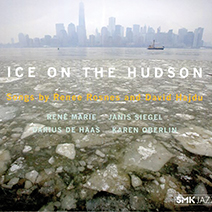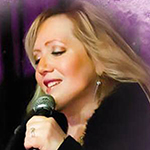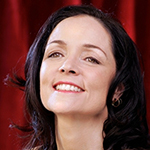Ice on the Hudson
Songs by Renee Rosnes and David Hajdu
(SMK Jazz)
October 18, 2019
Reviewed by John Hoglund for Cabaret Scenes
 Sharp minds don’t always think alike. Yet, with Ice on the Hudson, this first-time effort by respected jazz pianist/composer Renee Rosnes with esteemed author/journalist David Hajdu proves fortuitous on this one-of-a-kind album. It’s filled with observational songs about life and its absurdities with a socio-political bent that makes for a tender and whimsical mix.
Sharp minds don’t always think alike. Yet, with Ice on the Hudson, this first-time effort by respected jazz pianist/composer Renee Rosnes with esteemed author/journalist David Hajdu proves fortuitous on this one-of-a-kind album. It’s filled with observational songs about life and its absurdities with a socio-political bent that makes for a tender and whimsical mix.
The two are seasoned pros in the world of contemporary jazz songwriting. The bottom line is that the songs work, and the listener is all the richer for indulging in this 11-song musical treatise of imagination and wonder that is in its own league.
With four relevant artists’ sharing the songs, the album speaks in a way that pulls the listener into a new world with ease. Possibly Will Friedwald says it best in his liner notes, “No one working in the jazz idiom has ever written songs like these. They stretch well beyond the boundaries of jazz songwriting as we know it.
”
The artists—Janis Siegel, Darius de Haas, René Marie, and Karen Oberlin—have teamed with the songwriters’ and the results are a fusion of technically pure vocals and intelligent tunes that are made for each other. The beauty here is apparent and makes one wish there were more cuts on the disc. Rosnes composed the music and Hajdu wrote the thought-provoking lyrics. The words and music are at highly intelligent but are still accessible in a way that cracks barriers. For instance, on “A Tiny Seed,” Marie sings about a king who built a wall around his kingdom. A tree happened to fall, and one seed fell from a branch and a new tree grew. Years later, that tree fell and broke the wall to bits. It all began with a tiny seed—“A tiny seed is all you need.” Marie also shines on “Little Pearl,” a sonnet about the planet earth. On the album’s title cut, Siegel perfectly captures a pensive mood in this melancholic story-song about the clever contradictions and metaphors that make up our lives: “Which is the story, the plot or the theme?/The ice on the Hudson flows upstream/and sometimes, flows down.” Siegel’s smoky alto also molds the moody lament “I Used to Like to Draw” with a matter-of-fact truthfulness that paints a subtle picture of moving on after making mistakes. The arrangement and delivery are exceptional as this pitiable tale unfolds without drama.
https://www.blendedentalgroup.com/wp-content/languages/new/sildenafil.html
De Haas brings a cynical reading to “Trotsky in Mexico” a devilish portrait of jealousy between Frida Kahlo and Diego Rivera that involves exiled Russian revolutionary Trotsky. It’s a tricky song to sing, but de Haas, as usual, nails it, and it is a delight. His expressive vocals tell a heartfelt tale in “To Meet My Brother” aided by Ken Peplowski’s pining clarinet, making for a beautiful cut. Karen Oberlin opens her heart on the trenchant ballad, “All but You,” sung with sparrow-like tones that caress this beauty. She also sparkles on the whimsical “I Like Pie.” This fun ditty, which sounds like it could have been lifted from a Broadway show, is catchy and memorable as Oberlin (with help from cellist Erik Friedlander and drummer Rogerio Boccato) simply flies on this frisky tongue-twister.
The gentle ballad “Confound Me” wraps up the CD. Sung with feeling by de Haas, it’s a sweet homage to breaking free and learning in life. It’s the perfect ending to the high standards on this unique disc, which deserves attention for the excellence these new collaborators bring to brilliant and complex songs.
Hopefully, there will be more to come.
https://www.blendedentalgroup.com/wp-content/languages/new/grifulvin.html
It’s needed.
The incandescent musicians who play on the album are at the top of their game: Renee Rosnes (jazz piano), Sean Smith (bass), and Carl Allen (drums). Guest musicians are Ken Peplowski (clarinet), Erik Friedlander (cello), Steve Wilson (saxophone), Rogerio Boccoto, and Seamus Blake (saxophone).





